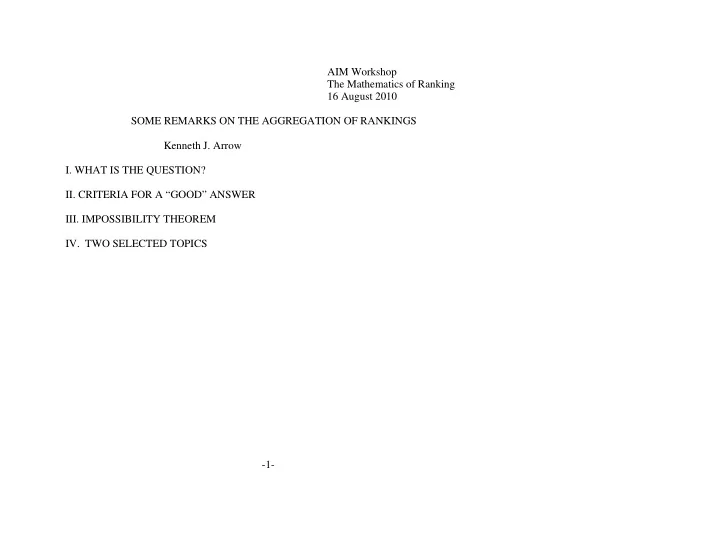

AIM Workshop The Mathematics of Ranking 16 August 2010 SOME REMARKS ON THE AGGREGATION OF RANKINGS Kenneth J. Arrow I. WHAT IS THE QUESTION? II. CRITERIA FOR A “GOOD” ANSWER III. IMPOSSIBILITY THEOREM IV. TWO SELECTED TOPICS -1-
I. WHAT IS THE QUESTION? A. The Selection of Investments in a Multi-owner Firm. Ordinally valid interpersonal comparison B. Elections C. Legislation D. Criteria for Choice of Social Policy: Moving the Question One Level Up -2-
II. CRITERIA FOR A “GOOD” ANSWER A. Ordinality All The Way B. Universal Domain C/. The Borda Count: Two Interpretations (within feasible set, all possible alternatives) D. Independence of Irrelevant Alternatives E. Non-imposition F. Monotonicity, Pareto principle 1. Monotonicity: If x is ranked socially above y and if an individual preference is changed from y over x to x over y (everything else constant), then x is still ranked above y. 2. Pareto: If everyone prefers x to y, then x ranks above y. G. Non-dictatorship, anonymity H. Neutrality among alternatives -3-
III. IMPOSSIBILITY THEOREM A. STATEMENT There is no mapping from a set of rankings to a single ranking which satisfies Universal Domain, Independence of Irrelevant Alternatives, Monotonicity, Non-imposition, and Non-Dictatorship. B. IMPLICATIONS FOR ELECTIONS (Bush-Gore-Nader) C. IMPLICATIONS FOR LEGISLATION D. VOTING EQUILIBRIUM: McKelvey’s Chaos Theorem: If there is not a Condorcet (pairwise majority) winner in a Euclidean space, then for any two alternatives, we can find a sequence of alternatives leading from one to the other by majorities. Is political science chaotic? -4-
IV. TWO SELECTED TOPICS A. AXIOMATIZATION OF MAJORITY RULE 1. (K. May) Assume universal domain, independence of irrelevant alternatives, monotonicity, anonymity, and neutrality. Then, for pairwise choices, we must have majority rule 2. (P. Dasgupta, E. Maskin) If, on a restricted domain of preferences, we have an aggregation satisfying independence of irrelevant alternatives, Pareto, anonymity, and neutrality, then majority voting also satisfies these conditions. 3. (D. Black) If we restrict preferences to be unimodal on a line, then majority voting satisfies all conditions. B. CARDINAL UTILITY (interpersonally valid) Sum of utilities. Balinski – classification. Approval voting (if classification independent of set of alternatives, like Borda). -5-
Recommend
More recommend